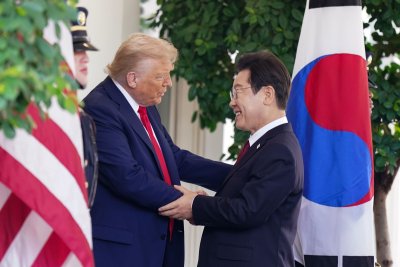SEOUL, Sept. 2 (UPI) — South Korea’s state-backed companies and private enterprises promised significant investments in the United States to coincide with President Lee Jae Myung’s summit with his American counterpart Donald Trump at the White House on Aug. 25.
From Washington’s perspective, more investments from South Korea contribute to the U.S. economy, and Seoul’s ruling Democratic Party described President Lee’s U.S. trip that led to those investments as a success.
But suspicions arise about whether such measures would also help South Korea. The main opposition People Power Party, for example, accused the Lee administration of overpromising.
“The Lee Jae Myung administration pledged another $150 billion in direct U.S. investment in addition to the existing $350 billion commitment, thus offering a massive ‘gift package’ totaling $500 billion,” the party’s chief spokesman, Park Sung-hoon, said in a statement.
“However, on critical issues directly tied to our national interest, not a single concrete achievement or clear outcome was secured,” he added.
Park pointed to Washington’s continued 25% tariff on made-in-Korea automobiles, despite a July understanding to reduce it to 15% in return for Korea’s $350 billion investment pledge.
Other Observers echoed concerns, as well.
“Just let me know what President Lee gained in return for promising much. At the very least, he should have secured a definite timeline for the 15% tariff reduction,” economic commentator Kim Kyeong-joon, formerly vice chairman at Deloitte Consulting Korea, told UPI.
“Our foreign exchange reserves are just above $400 billion. I don’t think it’s plausible to invest more than our total reserves in a single foreign country. And if we do so, we risk losing the ability to invest within our own borders, which would be disastrous for our economy,” he said.
Lee Phil-sang, an adviser at Aju Research Institute of Corporate Management and former Seoul National University economics professor, concurred.
“My real concern is that President Lee may have made undisclosed concessions. I hope that hasn’t happened,” he said in a phone interview.
“The worst part of the summit is that we made lots of promises, while the U.S. offered little in return. I fear Washington will demand more in upcoming working-level talks following the Lee-Trump meeting,” he added.
By contrast, Leaders Index CEO Park Ju-gun downplayed the criticism. His company is a Seoul-based business tracker.
“Many Korean companies did not sign binding contracts. Most agreements were [memoranda of understanding], which might never materialize. And I don’t think that the overall investment in the U.S. would reach $500 billion. Many concerns are overblown,” Park said.
New investment promises from South Korean firms
Hyundai Motor Group announced that it would invest $26 billion in the U.S. between 2025 and 2028, expanding its push into automotive, steel and robotics. It marks a $5 billion increase from its original $21 billion commitment unveiled earlier this year.
With the funds, Hyundai Motor plans to boost vehicle production, build a new steel mill in Louisiana and construct a robotics facility with an annual capacity of 30,000 units.
Korean Air said the flagship carrier would channel $36.2 billion to buy 103 aircraft from Boeing, including 95 passenger planes and eight freighters, by the end of the 2030s.
Once finalized, the deal would raise the Seoul-based company’s total Boeing orders to 175 aircraft, up from the 72 already on its books.
Hanwha Group vowed to funnel $5 billion into Hanwha Philly Shipyard in Philadelphia to install additional docks and quays to crank up the capacity of the shipyard, which Hanwha acquired late last year from Norway’s Aker ASA.
Nuclear cooperation was another area where the South Korean side, led by state-run Korea Hydro & Nuclear Power Corporation, or KHNP, inked several agreements to support various U.S. projects.
Together with POSCO International, KHNP agreed to cooperate with Fermi America to take part in the construction of an 11-gigawatt power complex. It will explore potential investment by joining with Centrus Energy.
KHNP also teamed up with Korea’s Doosan Enerbility to collaborate with X-energy of Maryland and Amazon Web Services of Seattle with the aim of accelerating the deployment of small modular reactors and fuel in the United States.
Not all accords centered on U.S. investment. Korea Zinc, the world’s largest zinc smelter, signed a memorandum of understanding with Lockheed Martin to procure and supply of germanium, whish is used primarily in fiber optics, infrared optics and electronics.
They are plan work together in the critical minerals supply chain.
